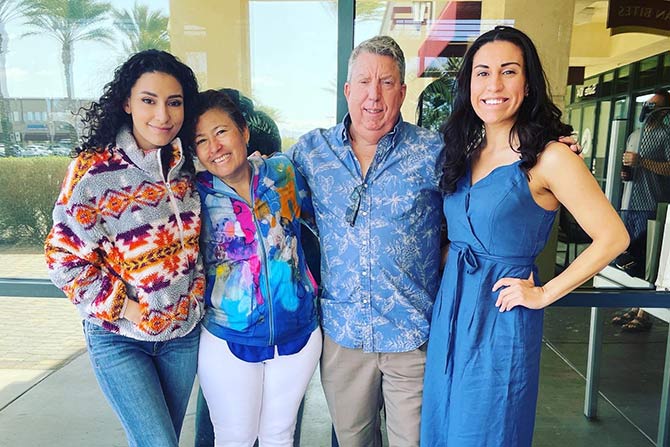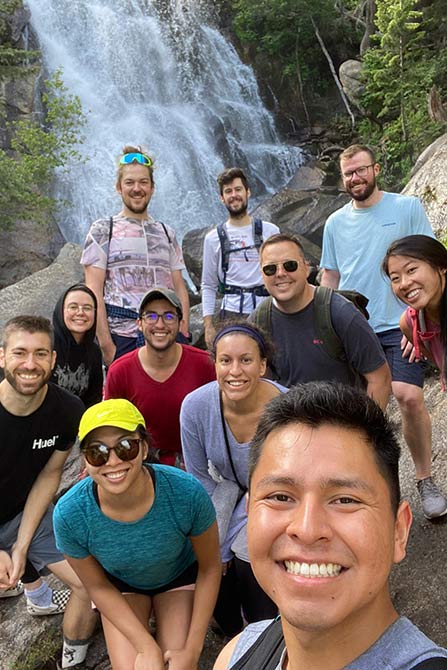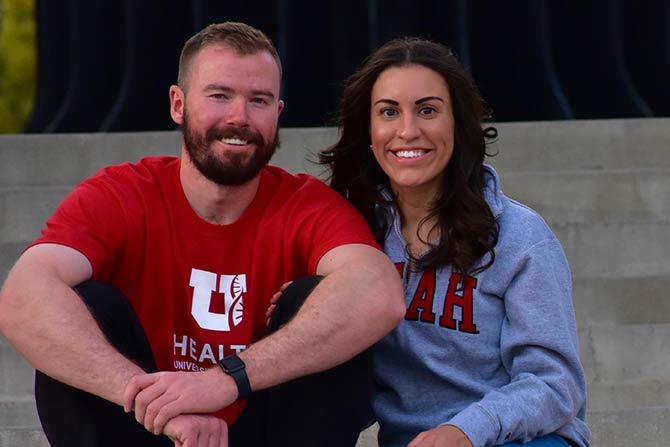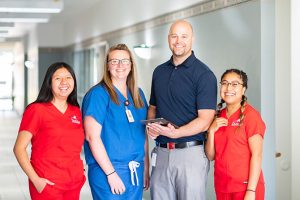A Bit About Dr. Albanese
I am originally from Las Vegas, Nevada! Moving away for college, I attended the University of Nevada Reno, where I studied chemical engineering and neuroscience. I then returned to my hometown of Las Vegas to be one of the members of the University of Nevada Las Vegas School of Medicine charter class.
I met my now husband during our first year of medical school. Lennon and I were lucky to have much of our family living in Vegas when we were going to medical school. Thus, we were able to enjoy weekly family meals. In addition, Lennon and I spent every chance we got exploring the food scene in Vegas, traveling internationally and attending music festivals. We continue to embrace our passion for food, music and travel during our residencies.
The Med School Journey
Growing up, my dad always advised me to “Go with [my] gut.” If someone had asked me seven years ago where I would be today, I would have never guessed that I would be one year away from completing residency. At that time, I was a young, naïve, first-generation Hispanic woman living out my American Dream as I pursued a degree in chemical engineering. I felt very lost and could not seem to find a fitting career that met my goals. That “gut” feeling advised me that I needed to do some soul-searching, which led to a decision to pursue medicine. In many ways, that same “gut” feeling led me on my journey to family medicine, demonstrated by my love for broad-scope practice, community involvement and curiosity for research.
As a proud member of the UNLV School of Medicine charter class, I had the unique opportunity to build community with my peers and within Las Vegas. As a child, I never understood why my mom, an immigrant, had such distrust in the medical system. Now, as a medical student, I know many patient populations experience inequities in accessing care and health outcomes. Being an underrepresented minority in medicine myself, I believe it is of the utmost importance to recruit people of diverse backgrounds into medicine to help provide the best care to our patients and help resolve these inequities. One of my proudest accomplishments was collaborating with my peers to create multiple pipeline programs through mentorship in organizations such as the Latino Medical Student Association, Medical Student Ambassadors and Phi Delta Epsilon. These pipeline programs were developed to create a process of engagement with high school and college students interested in medical careers. I plan to continue community engagement during residency.
Choosing Family Medicine
In my third year of medical school, I discovered my passion for many specialties, which inspired my desire to pursue broad-scope practice. During surgery and obstetrics/gynecology, I loved seeing patients through their disease course, from conservative management to surgery. Then on pediatrics, I found myself excited to advocate for my patients. While on internal medicine, I had the unique experience of connecting with geriatric patients undergoing end-of-life care. Although excited by these fields, I could not shake the feeling that I was not meant to be in those specialties. Finally, on my family medicine rotation, I felt the “gut” feeling that told me I belonged there. I witnessed my mentors fulfilling various roles as family medicine physicians: community role models, educators, leaders, friends and confidants. Reflecting on my career goals — commitment to creating lifelong patient relationships, leadership in medicine, education, advocacy, community involvement and research — I felt I finally found my home in family medicine with my mentors embodying the future I imagine for myself. I applied to the University of Utah because of the wonderful opportunities to get full-spectrum training from passionate family medicine doctors. My faculty mentors exemplify that, even in an urban setting, full-spectrum medicine exists as they work in multiple settings.

How to Survive and Thrive in Residency
I love my co-residents! We became close through our Friday protected time called “Survival Skills,” where we would meet up afterward for “Foodie Friday.” Every week during my intern year, my class went to a different restaurant in town and invited our families, team medical students and friends. Each week someone different chose, allowing us to get to know each other through food. This became a wonderful tradition as everyone was able to share a bit of themselves by showing us their comfort food or helping us indulge in a new experience. This built lasting friendships. I am proud to be friends and colleagues with my co-residents and am excited to see what they all do in their next chapter of life.
The Next Steps
I am currently in the interview stage for fellowship! I applied for FMOB! After fellowship, I plan to pursue being faculty in an urban underserved setting, practicing full-scope family medicine, including outpatient, inpatient and obstetrics care. I am particularly passionate about reproductive health, gender-affirming care, LGTBQ+ health, mental health, Latino health, advocacy, healthcare policy, research and medical education.
In the next 20 years, I would like to see medicine become a single-payer system so that our patients can get the most optimal medical care for the lowest, most affordable price. In addition, I hope physicians will be able to unionize to obtain more protections. All the inequities and fragility of our system were exposed and highlighted during the height of the pandemic. I think there is an energy in our society of wanting better conditions since the pandemic. This is a great time where I believe important changes will be made in many sectors, not just medicine.
Advice For My Younger Self
Do things you are passionate about because you never know where your journey is going to take you. I did follow my passions, but I always felt a sense of insecurity, wondering if I should be doing more traditional pre-med things. Now, in retrospect, I am incredibly happy with my journey, and if I ever walk away from medicine, I feel that I have had meaningful life experiences.








